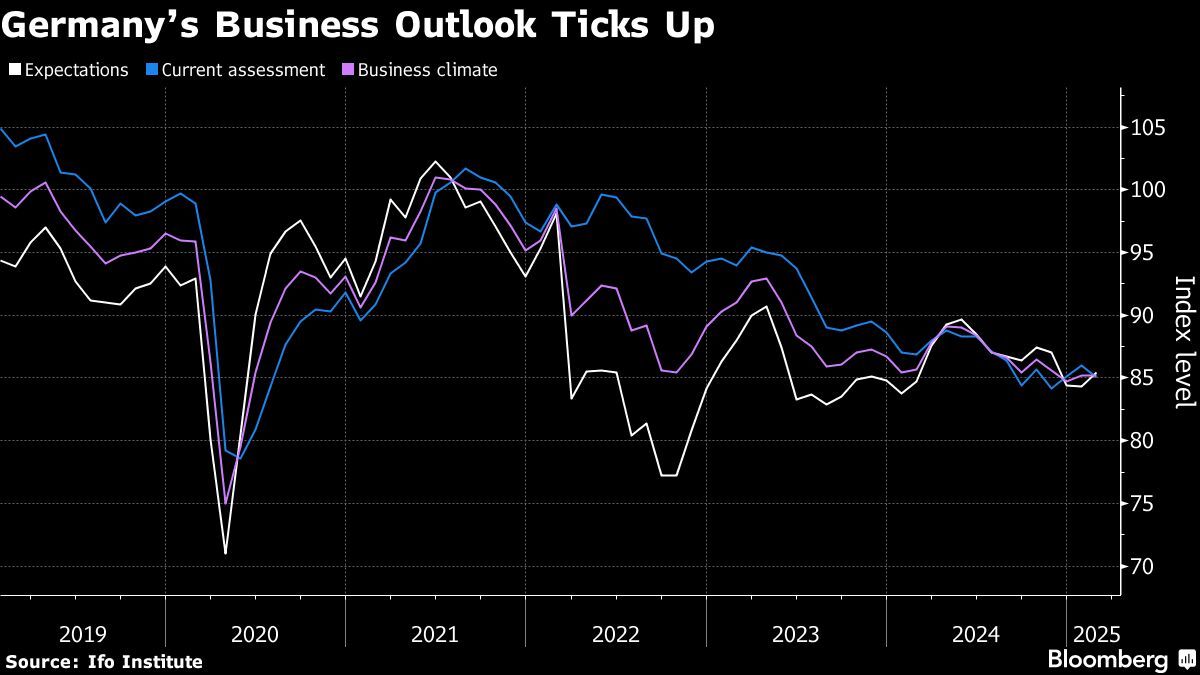
The Ifo institute rose to 85.4 in February from 84.3 the previous month as pptimism among German companies grew in expectation of a change in government following Sunday's elections.
(Feb 24): Optimism among German companies grew, feeding hopes of a turnaround for Europe’s largest economy that may also benefit from a change in government following elections on Sunday.
An expectations index by the Ifo institute rose to 85.4 in February from 84.3 the previous month. This was above the 85 median estimate in a Bloomberg survey. A measure of current conditions fell.
“People are holding back investment, people are holding back spending because there is a lack of trust,” Ifo President Clemens Fuest told Bloomberg Television on Monday. “So if the coalition negotiations do not last too long, and if the new government comes up with an agenda that inspires confidence, the situation could change in the second half of the year.”
While a quick and strong recovery still looks unlikely, Germany’s prospects are brightening a little after gross domestic shrank for a second straight year in 2024. Monday’s data add to other recent positive developments: Private-sector activity beat expectations in February, while investor confidence rose by the most in two years.
The country is still suffering from cyclical weakness due to weak global demand, as well as structural difficulties like the cutoff of Russian energy supplies, over-regulation and a dearth of skilled workers. US President Donald Trump’s trade threats pose additional risks.
“The further path of the economy will heavily depend on the possible introduction of US tariffs and whether coalition negotiations following Sunday’s election results in a stable government capable of tackling the country’s pressing problems. We see German GDP to grow merely by 0.3% in 2025,” says Martin Ademmer, economist at Bloomberg Economics.
Some observers hope a new government under Friedrich Merz, who leads of the conservative CDU/CSU bloc and is seeking an alliance with the Social Democrats, will bring more growth-oriented policies capable of helping the country out of its rut.
“In terms of having a government which is able to act, this was the best possible outcome,” Fuest said. “It was close, but we now have two parties that have cooperated in the past and that hopefully see the situation, the difficult situation of the country, and get their act together and form a stable government.”
A key question will be whether the next administration overhauls the debt brake, a limit on state borrowing that’s increasingly seen as unfit for purpose given Germany’s vast spending needs.
“We urgently need new investment,” Fuest said. “We need more innovation, more startup companies, and we also need more willingness to work to supply labour.”
Uploaded by Felyx Teoh
- Gas pipeline blaze: Petronas Gas, Gas Malaysia’s shares open marginally lower after trading halt
- Gas pipeline blaze: MIDF flags potential RM18m impact to Petronas Gas
- Police to look into allegations that digging caused gas pipeline fire
- T7 Global plunges to two-year low as executive deputy chairman departs
- Digital banks in Malaysia urged to re-examine strategies to better serve B40 segment
- Walmart keeps price pressure on suppliers after Beijing pushback — Bloomberg
- Alibaba prepares for flagship AI model release as soon as April, Bloomberg News reports
- US dollar outlook more subdued, but tariffs souring sentiment
- Grab obtains Land Transport Authority licence to operate taxis in Singapore
- US job openings decline in February amid rising economic uncertainty

